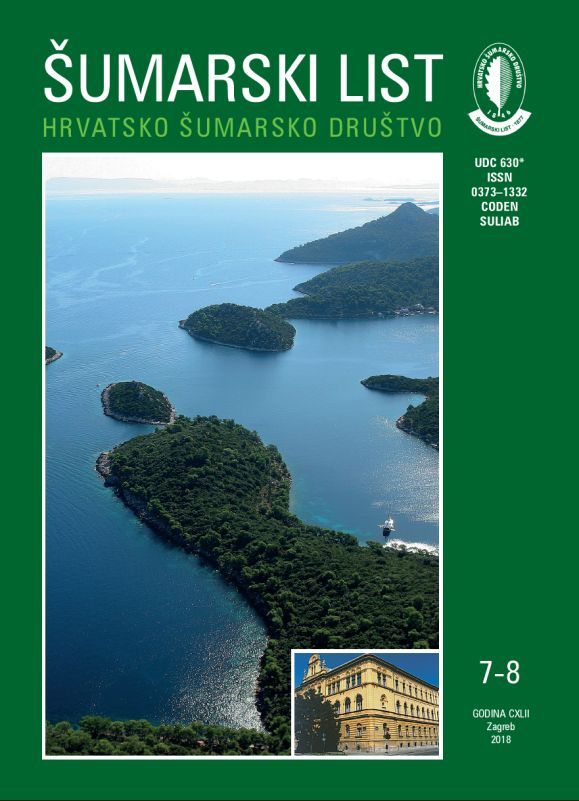
broj: 7-8/2018
pdf (15,28 MB) |
|
||||||||||||||
| RIJEČ UREDNIŠTVA | ||
| Uredništvo | ||
| FORESTS IN THE LIGHT OF THE NEW FOREST ACT pdf HR EN | 349 | |
| IZVORNI ZNANSTVENI ČLANCI | ||
| Mladen Ognjenović, Ivica Čehulić, Ante Kaliger, Maja Križanec, Anamarija Laslo, Ivan Seletković, Nenad Potočić | UDK 630* 114 (001) https://doi.org/10.31298/sl.142.7-8.1 | |
| The influence of soil conditioner „Herbafertil“ on the growth and development of amur maple (Acer tataricum L. ssp. ginnala Maxim.) in a nursery trial pdf HR EN | 351 | |
| Violeta Dimitrova | UDK 630* 537 (001) https://doi.org/10.31298/sl.142.7-8.2 | |
| Stocks of dead biomass of beech (Fagus sylvatica L.) forest ecosystems in West Balkan Range, Bulgaria pdf HR EN | 363 | |
| Summary The dead trees play an important role in the functioning and productivity of the forests’ ecosystems through influence over biological diversity, the accumulation of carbon dioxide, nutrient turnover and energy flux, hydrological processes, protection of the soils and the regeneration of tree species. The dead wood assures important habitats also. In historical aspect, for many years the dead wood was removed from the stands as a measure for protection against insects and fungi, which are perceived as a threat for the healthy forest status. This leads to reduction of the quantity of the dead wood in the forest ecosystems to critical low levels, which are not enough for maintaining the vital populations of many forest species. During the past years, the new settings in the national legislation, especially these related to the Natura 2000 development and management, require the quantity information about this component for the forest habitats assessment. In this regard, the objective of this study was to obtain quantitative data on stocks of dead forest biomass in beech communities in West Balkan Range. The amount of standing dead wood was calculated with height rates tables; method of line intersect sampling was used for determination of the lying dead wood stocks. Thomas scale was used to assess the degree of decomposition of standing dead biomass (Table 2) and a 4-point harmonized scale for lying biomass and stumps (Table 3). It was found total dead wood biomass stocks variation in the range of 14.48 - 41.8 m3.ha-1 as a result of studies conducted in beech stands (Table 5). The standing dead wood biomass was 6.7-17.5 m3.ha-1, lying dead wood biomass was 3.4-26.5 m3.ha-1, stumps were 0.28-6.4 m3.ha-1. The observed standing dead trees were mainly from the fourth level of decomposition. The prevailing rate of decomposition for lying biomass was B and for stumps were C and D (Table 6). It can be generalized from the results of current study that the percentage of the total amount of dead wood to the total forest yield was insufficient from a conservation perspective. Key words: dead wood; stocks; beech communities. | ||
| Michal Bugala, Zuzana Parobeková, Ján Parobek | UDK 630* 180 + 564 (001) https://doi.org/10.31298/sl.142.7-8.3 | |
| Influence of the ecological conditions on the productive potential of Grey alder pdf HR EN | 371 | |
| PRETHODNO PRIOPĆENJE | ||
| Zdravko Dolenec | UDK 630* 148.2 + 111 https://doi.org/10.31298/sl.142.7-8.4 | |
| Results of long-term monitoring of timing of laying in deciduous forest Blue tit (Cyanistes caeruleus L.) in northwestern Croatia pdf HR EN | 381 | |
| Ebubekir Gündogdu | UDK 630* 451 + 153 https://doi.org/10.31298/sl.142.7-8.5 | |
| A new location record of European polecat (Mustela putorius L.) from northeastern forests in Turkey pdf HR EN | 387 | |
| PREGLEDNI ČLANCI | ||
| Martina Đodan, Robert Brus, Anne-Mareen Eisold, Valeriu-Norocel Nicolescu, Milan Oršanić, Kristina Pratasiene, Sanja Perić | UDK 630* 181.5 https://doi.org/10.31298/sl.142.7-8.6 | |
| Non-native tree species in the viewpoint of climate change: chances and opportunities - Croatia as a case study pdf HR EN | 391 | |
| Markéta Špaková, Božena Šerá | UDK 630* 174 + 272 https://doi.org/10.31298/sl.142.7-8.7 | |
| Woody plants of the main part of the Bečov Botanical Garden pdf HR EN | 403 | |
| STRUČNI ČLANCI | ||
| Darko Posarić, Stjepan Nikolić | UDK 630* 582 https://doi.org/10.31298/sl.142.7-8.8 | |
| Establishment of a network of haulage tracks and silvicultural trails in Pedunculate oak forests as a way of more efficient stand tending and more efficient forest exploitation pdf HR EN | 411 | |


